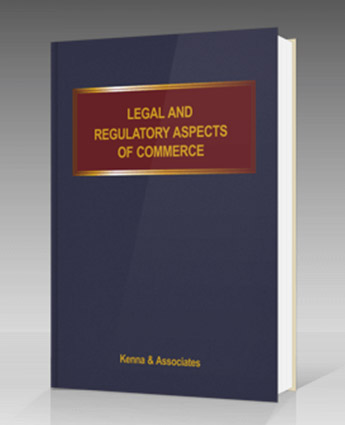This work is a collection of papers and articles written by kenna & associates lawyers, both incumbents and alumni (although actual authorship had been undertaken during incumbency). Although many of the papers have been delivered at conferences on the cognate subject, a great many of the articles had been written specially for contribution to the legal research notes, which for upwards of five years had been the pre-occupation of the research unit of the firm.
Many of the articles and papers have been given rise by actual experience by counsel advising clients on diverse disciplines of commercial law, as well as litigating and arbitrating disputes arising from commercial transactions. Accordingly as to be expected, many of the articles have been culled from actual considered opinions of counsel on the subjects. The initial idea for the writing of this book had been mooted at our breakfast sessions at which industry leaders have had the opportunity of sharing experiences, challenges, frustrations, opportunities, and friendship on a business-to-business level.
Within the last eight years, commerce in Nigeria, (within the context of the legal and regulatory environment), has been characterized by a continuous policy of activism, leading to major milestones. From the mobile telecommunications licence auctions of the early 2000’s to the pension reforms of 2004, to the bank recapitalization exercise of 2005, to the nascent insurer recapitalization exercise, to the ‘unbundling’ of the defunct National Electric Power Authority (leading to its acquired new name, Power Holding Company Nigeria). This also extended to the merger of the joint Maritime Labour & Industrial Council with the National Maritime Authority (culminating in all-new Nigerian Maritime Administration and safety Agency), and to the adoption of the landlord port model by the Nigerian Ports Authority in the port reforms of 2005. The economy has been awash with activity. It was in this same period that the Cabotage Act was enacted. The same period saw the birth of the Economic and Financial Crimes Commission and the Independent Corrupt Practices Commission; it was during the same epochal times that the Supreme Court of Nigeria handed down its decision in what had become known as the Resource Control Suit.
This particular decision had promised, and did engender, serious consequences for the operators of the respective production sharing contracts and joint operating agreements in the oil and gas sector. In the course of the same period Nigeria exited the Paris and London Clubs of international creditors and strengthened the framework for the sustainable management of domestic debt. During the same period, the Corporate Affairs commission (CAC) introduced the “same-day” incorporation procedure and the Securities and Exchange Commission launched the code of Corporate Governance for Quoted Companies. The “same-day” incorporation procedure had been recommended to the CAC by the firm in a World Bank funded study of legal and regulatory impediments to small business formalization.
On the private sector of the economy, activity levels peaked during the period and the indicators and readings were quite encouraging. Many more enterprises got quoted on the Nigerian Stock Exchange as market capitalization grew in geometric proportions, whilst investor confidence continued to rise with the influx of significant foreign direct and portfolio investments. A couple of Nigerian stocks were listed on overseas bourses as well. Corporate bonds had never been so well promoted and professionally practiced as they have been during the period as the federal government, and several state governments have been frequent callers at the bonds market, for different purposes.
In all of this, we have constantly found our clients in need of legal solutions to novel issues presented to the world of modern commerce by an evolving legal milieu. And the finding of efficient, ethical, and justifiable solutions to these legal and regulatory issues has dominated the Firm’s practice during the period in reference. It is therefore the object of this work to document its responses to the active issues in doing business in Nigeria and to provide supporting information for the benefit of all who are interested in the subject: doing business in Nigeria. This work, it must be admitted, is not one of those be-all-know-all kinds of books. It is a manual on commerce, as it were, with an emphasis on the legal and regulatory aspects. Accordingly, copious references to case law and statute have been carefully avoided, these being provided only where necessary to explain an issue in hand, which may not be otherwise so fully explained. Ofcourse, some of the articles and papers have surrendered their original titles and headings to editorial ‘intrusion’. Perfection continues to pertain to the divine, and therefore remains only a noble aspiration for the world terrestrial. This work would not lay any claim to perfection but one thing is doubtless: the contributors have brought a wealth of research and experiential knowledge to bear on the work, and therefore deserve commendation. We do hope that the material contained herein will be of benefit to their intended audience: commercial and investment lawyers, investment and corporate bankers, lawyers generally, entrepreneurs and investors, business managers and everyone involved in the decision-making process and in the legal risk evaluation and management process.
Nzeakor Atulomah
1 September, 2007


